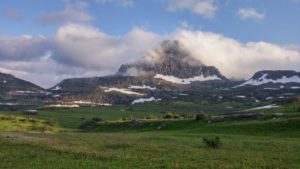 Our month-long bike tour across Montana is coming to an end. We stop for lunch just outside the park and, inevitably, go for a much-needed swim in the Flathead River. As I ease myself into the cold water, suddenly I forget my frustrations from the last couple of days. Heat, hunger, traffic, and exhaustion no longer matter to me. I am content to enjoy the cool water and beautiful surroundings of Glacier National Park.
Our month-long bike tour across Montana is coming to an end. We stop for lunch just outside the park and, inevitably, go for a much-needed swim in the Flathead River. As I ease myself into the cold water, suddenly I forget my frustrations from the last couple of days. Heat, hunger, traffic, and exhaustion no longer matter to me. I am content to enjoy the cool water and beautiful surroundings of Glacier National Park.
Glacier is nothing new to me. I have lived in Montana for about seventeen years, and visit the park often. While we were in Helena a couple weeks ago, I saw some framed, unmarked photographs on the wall in a local wine shop. I instantly recognized them as being from the park, so I asked the shopkeeper about them. Although I hadn’t had the confidence to say anything specific, it turns out I had correctly identified both the trails the pictures were taken from. The true beauty of this park, for me, is that no matter how many times I visit, I never cease to be amazed. Sometimes, I have to restrain myself from taking pictures of the same peaks and streams that I have already photographed hundreds of times before. It is certainly a very special place.
Visiting Glacier also makes me feel very small. It makes one realize how insignificant we are, as humans. It is difficult to fathom the sheer power and time it took to create this magnificent place. Our world, in various states, has been around for much longer than is easy to imagine. All of human history is but a small dot on the timeline of the Earth. We are so insignificant compared to nature that I can begin to see why many people are skeptical that we could have any noticeable impact. Of course, I am talking about climate change.
Unfortunately, it seems clear that human activities do contribute to climate change, and therefore the changing ecosystems here in Glacier National Park. If we were causing these changes in a more obvious, tangible way, there would be an uproar. But climate change is subtle, intangible, and shrouded in uncertainty. It is difficult for a layman to conclusively identify the effects, especially when they are masked by the variations of local weather. A walk to the beach won’t reveal a slowly rising ocean, a day hike won’t shed light on climbing timber lines, and a skyward glance can’t expose the pollution in our air. This makes addressing climate change a lot more of a challenge. By the time these changes are clearly apparent, it may be too late.
Sometimes our future can look very bleak. The world’s proven fossil fuel reserves are nearly five times that of what some scientists believe we can safely burn and still have a reasonable chance of keeping average global temperature rise below 2˚C. There is an extraordinary economic incentive to continue depending on fossil fuels – the necessary infrastructure for and reliance on fossil fuels has been built up for over two centuries. This also makes the possibility of a quick transition to alternative energy sources seem unlikely. If fossil fuels were the most convenient energy source and it still took us two hundred years to develop the system to where we are now, how could we possibly speed up the process to develop a new system in less than half a decade? Can we truly reduce global emissions enough to see a difference?
However, as I sit here in the park, surrounded by age-old mountain peaks, I am somehow more optimistic. I wonder; if we are powerful enough to unwittingly change nature for the worse… what sort of positive change might we be capable of? Sure, a global energy revolution has never happened before in such a short time, but by no means does that mean it is impossible. It will not be easy; but we are a cause of climate change. So surely if we put our mind to it, we are capable of doing something about climate change. We just have to make that choice.